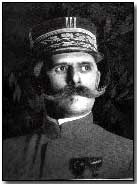Who's Who - Denis Auguste Duchene
 Denis Auguste Duchene (1862-1950) was
among the French commanders whose military careers came to an abrupt end
during the great German push of Spring 1918 for their failure to employ
Commander in Chief
Petain's edict requiring defence in depth.
Denis Auguste Duchene (1862-1950) was
among the French commanders whose military careers came to an abrupt end
during the great German push of Spring 1918 for their failure to employ
Commander in Chief
Petain's edict requiring defence in depth.
Duchene's war began with his installation as a brigade commander; he thereafter achieved decent progress (through divisional and corps command) before ending up as commander of Sixth Army in December 1917.
Tasked with defence of the Aisne front his forces held the high ground on the famed Chemin des Dames; all well and good but for the fact that he was one of many commanders who were openly contemptuous of Henri-Philippe Petain's notion of elastic defence - that is, defence in depth. Rather, his idea of defence required the traditional posting of large numbers of infantry in the front line.
Three of the divisions under Duchene's command were British, led by Heneker, Campbell and Jackson, respectively. All three Major-Generals, they were alarmed at Duchene's approach to infantry deployment - having experienced the pitfalls of such defence against the Germans in Flanders - and personally protested their concerns to Duchene. He remained adamant, aloofly dismissing the fears of all three.
Calamity came to visit in late May with the Third Battle of the Aisne. Ironically the three British divisions were among the most badly hit by the German steamroller that punched across the Aisne from 27 May onwards, three armies sent by Ludendorff in what was one of the great surprise attacks of the war.
The Germans advanced some 19 kilometres in the space of three days, again reaching the Marne and seemingly within reach of Paris.
Duchene was summarily dismissed by French Prime Minister Georges Clemenceau on 9 June.
"Coffin Nails" was a term used by British soldiers to describe cigarettes.
- Did you know?
